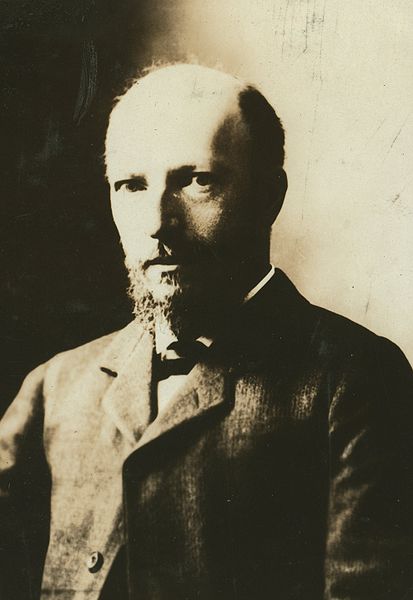
Eliciting the best in ourselves and others expands on the Golden Rule.
- Act So As to Elicit the Best In Others, and Thereby In Thy Self. [Felix Adler, An Ethical Philosophy of Life, Book III, Chapter VII.]
Felix Adler, founder of Ethical Culture, identified eliciting the best in others as the supreme ethical rule. It is a variation on the Golden Rule, in that it looks explicitly at the ways in which our behavior can influence the thoughts, feelings and actions of others. In so doing, it treats the quality and character of our relationships with others more actively: we are to elicit the best, thereby honoring people instead of merely respecting them.
Real
True Narratives
Technical and Analytical Readings
Photographs
Documentary and Educational Films
Imaginary
Fictional Narratives
Monseigneur Welcome had what the people term a "fine head," but so amiable was he that they forgot that it was fine. When he conversed with that infantile gayety which was one of his charms, and of which we have already spoken, people felt at their ease with him, and joy seemed to radiate from his whole person. His fresh and ruddy complexion, his very white teeth, all of which he had preserved, and which were displayed by his smile, gave him that open and easy air which cause the remark to be made of a man, "He's a good fellow"; and of an old man, "He is a fine man." That, it will be recalled, was the effect which he produced upon Napoleon. On the first encounter, and to one who saw him for the first time, he was nothing, in fact, but a fine man. But if one remained near him for a few hours, and beheld him in the least degree pensive, the fine man became gradually transfigured, and took on some imposing quality, I know not what; his broad and serious brow, rendered august by his white locks, became august also by virtue of meditation; majesty radiated from his goodness, though his goodness ceased not to be radiant; one experienced something of the emotion which one would feel on beholding a smiling angel slowly unfold his wings, without ceasing to smile. Respect, an unutterable respect, penetrated you by degrees and mounted to your heart, and one felt that one had before him one of those strong, thoroughly tried, and indulgent souls where thought is so grand that it can no longer be anything but gentle. [Victor Hugo, Les Misérables (1862), Volume I – Fantine; Book First – A Just Man, Chapter XIII, “What he believed”.]
Poetry
Music: Composers, artists, and major works
Many composers served as models through their work, thereby eliciting the best in other composers. In composing his piano works, Arthur Foote drew heavily on Chopin.
- 3 Morceaux, Op. 3 (1877-1880) (approx. 11’)
- 5 Pieces, Op. 6 (1883) (approx. 19’)
- Piano Suite No. 1 in D Minor, Op. 15 (1886) (approx. 14’)
- 9 Studies for the Piano, Op. 27 (1892) (approx. 23’)
- Piano Suite No. 2 in C Minor, Op. 30 (1894) (approx. 12’)
- 5 Bagatelles, Op. 34 (1892) (approx. 13’)
- 5 Poems after Omar Khayyam, Op. 41 (1898) (approx. 18’)
- Piano Serenade, Op. 45 (1914) (approx. 10-11’)
- 20 Préludes for the Pianoforte (in the Form of Short Technical Studes), Op. 52 (1903) (approx. 20’)
- 5 Silhouettes, Op. 73 (1913) (approx. 13’)
Jazz albums and gigs:
- Anouar Brahem, John Surman and Dave Holland, “Thimar” album (1998) (54’) is “a coming together of three very distinctive musicians who sacrifice none of their individuality in the search for common ground.”
- Company 91, Volume 1 (1991) (65’), Volume 2 (1991) (71’), and Volume 3 (1991) (69’): free jazz artists, including John Zorn, Buckethead, Derek Bailey, Paul Lovens and others produced some of the finest collaborative efforts in any musical idiom in these sessions.
- Thelonious Monk Quartet with John Coltrane at Carnegie Hall, November 29, 1957 (52’)
- Dizzy Gillespie & Charlie Parker, Jazz at Massey Hall, May 15, 1953 (70’)
- John Coltrane & Miles Davis, in collaboration: “The Final Tour” album set (221’); “In Stockholm 1960 Complete” album set; “Live in Zurich” album (59’); live in Copenhagen, 1960 (44’); live in St. Louis, 1957 (33’)
- Anthony Braxton: “Sextet (Istanbul) 1996” album; “Charlie Parker Project” (1993) (130’); Sextet (Victoriaville) 2005 (69’)
- Miles Davis, “’58” album (1958) (64’)
- “Mark Turner Meets Gary Foster” album (2019) (87’)
- Paamath & Jean-Paul Raffit, “Mburu” (2023) (47’): “Guitarist Jean-Paul Raffit, well-known in French jazz, is quite hard to classify and always in search of different cultures to draw from for his inner sources. Here, he is at the center of his inner universe with artist Paamath, whose deep storyteller voice will enchant you from the opening notes of this album. It is an incredibly rich album, a rare piece where we also find flutist Isabelle Bagur, who is absolutely masterful. She skillfully uses her intellectual flexibility to perfectly fit into this completely unclassifiable and highly intellectual project.”
Eddie “Lockjaw” Davis and Johnny Griffin were two saxophonists who brought out the best in each other, in their quintet, as reflected on their albums:
- “The Complete Sessions” (361’)
- “Ow! Live at the Penthouse” (59’)
- “Blues Up and Down” (68’)
- “Tough Tenors” (1969) (40’)
- “Battle Stations” (1960) (55’)
- “The Tenor Scene” (44’)
- “Tough Tenor Favorites” (39’)
Music: songs and other short pieces
- Josh Groban, “You Raise Me Up” (lyrics)